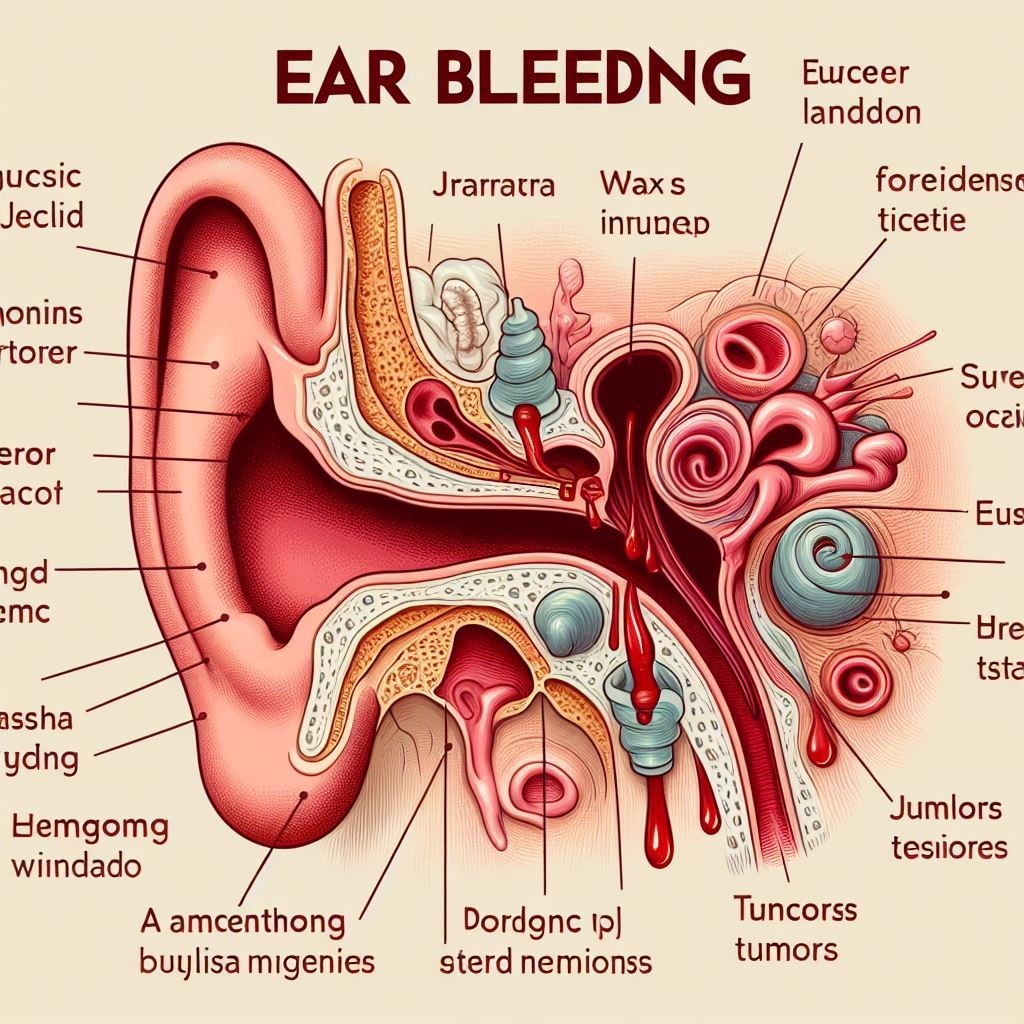Why is My Ear Bleeding? A Comprehensive Guide.
Explore the reasons behind “Why is My Ear Bleeding?” in this comprehensive guide. Understand the causes and find the right solutions for ear bleeding.
Introduction to Why is My Ear Bleeding

Have you ever noticed blood coming from your ear and wondered, “Why is my ear bleeding?” This unusual occurrence can be concerning and may leave you searching for answers. This comprehensive guide will delve into the causes of ear bleeding and provide valuable insights and information to help you understand this perplexing phenomenon. Whether you’re experiencing mild bleeding or a more severe episode, educating yourself about the potential underlying causes and seeking appropriate medical attention is essential. So, let’s embark on this journey of discovery and unravel the mysteries behind Otorrhagia.
Understanding Why is My Ear Bleeding
Let’s understand ear bleeding before delving into the causes and potential solutions. It can manifest as blood coming directly from the ear canal or as bloodstains on a cotton swab or pillow. Bleeding from the ear can range from minor, intermittent episodes to more severe and persistent instances. It’s important to note that ear hemorrhage is not a regular occurrence and should never be ignored. Identifying the cause of otologic bleeding is crucial to ensure appropriate treatment and prevent potential complications.
Common Cause of Ear Bleeding
Subtitle: Unveiling the Culprits Behind the Bleeding
Several factors can contribute to ear bleeding. Let’s explore some of the most common causes:
Trauma or Injury
Injuries to the ear, such as a direct blow or insertion of objects into the ear canal, can cause damage to the delicate structures inside, leading to ear hemorrhage.
Ear Infections
Infections in the middle ear or external ear, such as otitis media or otitis externa, can cause inflammation and damage to the ear tissues, resulting in bleeding.
Foreign Objects
Introducing foreign objects into the ear, like cotton swabs, bobby pins, or pencils, can injure the ear canal and trigger bleeding.
Perforated Eardrum
A perforated eardrum, often caused by trauma, loud noises, or middle ear infections, can lead to bleeding from the ear.
Barotrauma
Sudden changes in air pressure, such as during air travel or scuba diving, can cause barotrauma, which may result in ear bleeding.
Excessive Ear Cleaning
Aggressive or improper ear cleaning techniques, such as using sharp objects or pushing cotton swabs too far into the ear canal, can cause injury and bleeding.
Tumors or Growths
Rarely, tumors or growths in the ear, such as acoustic neuromas or cholesteatomas, can cause bleeding. These are just a few of the causes of otologic bleeding. It’s crucial to consult a healthcare professional for an accurate diagnosis and appropriate treatment based on your specific situation.
Seeking Medical Help to know Why is My Ear Bleeding

While some cases of otologic bleeding may resolve independently, knowing when to seek medical help is essential. Consider contacting a healthcare professional under the following circumstances:
Severe or Persistent Bleeding:
If the bleeding is profuse, continuous, or doesn’t subside after a stint, it is crucial to seek immediate medical attention.
Accompanying Symptoms:
severe pain, dizziness, hearing loss, or any other concerning symptoms accompanies if, we recommend it to consult a healthcare professional promptly.
Fever or Infection:
If you experience symptoms of infection, such as fever, discharge, or foul odor from the ear, it is essential to seek medical help for proper evaluation and treatment.
Recurring Episodes:
If ear bleeding occurs repeatedly or becomes a chronic issue, it is advisable to consult with a specialist to identify the underlying cause and implement appropriate management strategies.
Remember, it is always better to err on caution regarding your health. Seeking professional medical advice can help you address the issue promptly and prevent potential complications.
Diagnosing Ear Bleeding
When you visit a healthcare professional for ear hemorrhage, they will survey the cause. The diagnostic process may involve the following:
- Medical History: The doctor will inquire about your symptoms, medical history, recent trauma or infections, and medications you may be taking.
- Physical Examination: The healthcare professional will visually examine the ear canal and surrounding areas for any signs of injury, infection, or abnormalities.
- Otoscopic Examination: Using a specialized instrument called an otoscope, the healthcare professional will examine the ear canal and eardrum for any structural damage or signs of infection.
- Additional Tests: In some cases, other tests such as tympanometry (to assess eardrum function), audiometry (to evaluate hearing), or imaging studies (like CT scans or MRI) may be necessary to obtain a more comprehensive understanding of the underlying cause.
Treatment and Management Options
The treatment and management options for ear bleeding largely depend on the underlying cause. Here are some approaches:
- Medical Intervention: If the Otologic bleeding is due to an infection, the healthcare professional may prescribe antibiotics or antifungal medications to address the underlying issue. In cases of severe trauma or injury, surgical intervention may be necessary.
- Cauterization: In situations where bleeding originates from a specific area, cauterization may be performed to stop the bleeding and promote healing.
- Ear Drops and Medications: Depending on the diagnosis, the healthcare professional may recommend specific ear drops or medications to alleviate symptoms, reduce inflammation, and aid healing.
- Avoiding Irritants: To prevent further damage or irritation, it may be necessary to avoid activities such as swimming, loud noises, or exposure to excessive dust or smoke.
- Preventive Measures: Preventing ear infections, practising proper ear hygiene, and avoiding inserting objects into the ear canal can help reduce the risk of future episodes of otologic bleeding.
Remember, we individualize treatment plans based on the underlying cause and the severity of the condition. It is crucial to follow the advice and instructions provided by your healthcare professional.
Frequently Asked Question: Why is My Ear Bleeding?
Q: Why is my ear bleeding? Should I be concerned?
A: It can occur for various reasons, including trauma, infection, foreign objects, or underlying medical conditions. While some cases may be minor and resolved independently, seeking medical attention to identify the cause and determine the appropriate treatment is essential. Ignoring Blood discharge from the ear can lead to complications or delays in addressing any underlying issues.
Q: Can ear bleeding be a sign of a severe condition?
A: In some cases, bleeding within the ear canal can indicate a serious condition such as cancer or a severe infection. However, it’s also often due to less serious causes, like minor trauma or an ear infection.
Q: What should I do if my ear starts bleeding?
A: If your ear starts bleeding, stay calm. Avoid inserting anything into your ear, as this can cause further damage. Seek medical attention as soon as possible.
Q: Can I prevent ear bleeding?
A: While we can prevent not all causes of Blood discharge from the ear, you can reduce your risk by avoiding inserting objects into your ear, protecting your ears from extreme pressure changes, and seeking treatment for ear infections promptly.
Conclusion about Why is My Ear Bleeding
In conclusion, if you ask, “Why is my ear bleeding?” it is crucial to take action and seek medical help. While some cases may be harmless, we should never ignore Blood discharge from the ear. This comprehensive guide has given you an understanding of the common causes, the importance of seeking medical attention, the diagnostic process, and potential treatment options. Remember, your health and well-being are paramount, and it’s essential to prioritize them by consulting with healthcare professionals who can provide accurate diagnoses and personalized care. Take control of your ear health, and may your journey to understanding and managing Blood discharge from the ear be smooth and successful!
Reference
- National Institute on Deafness and Other Communication Disorders. (2019). Ear Infections in Children. Link
- Centers for Disease Control and Prevention. (2021). How to Prevent Ear Infections? Link



